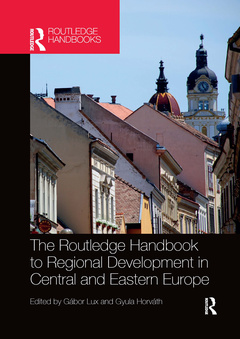The Routledge Handbook to Regional Development in Central and Eastern Europe
Coordonnateurs : Lux Gábor, Horváth Gyula

Twenty-five years into transformation, Central and Eastern European regions have undergone substantial socio-economic restructuring, integrating into European and global networks and producing new patterns of regional differentiation and development. Yet post-socialist modernisation has not been without its contradictions, manifesting in increasing social and territorial inequalities. Recent studies also suggest there are apparent limits to post-socialist growth models, accompanying a new set of challenges within an increasingly uncertain world.
Aiming to deliver a new synthesis of regional development issues at the crossroads between ?post-socialism? and ?post-transition?, this book identifies the main driving forces of spatial restructuring in Central and Eastern Europe, and charts the different regional development paths which take shape against the backdrop of post-crisis Europe. A comparative approach is used to highlight common development challenges and the underlying patterns of socio-economic differentiation alike. The issues investigated within the Handbook extend to a discussion of the varied economic consequences of transition, the social structures and institutional systems which underpin development processes, and the broadly understood sustainability of Central and Eastern Europe?s current development model.
This book will be of interest to academics and policymakers working in the fields of regional studies, economic geography, development studies and policy.
1. Regional Development Paths in Central and Eastern Europe and the Driving Forces of Restructuring: An Introduction Part I:Economic Transformation Processes Before and Beyond the Crisis 2. Reintegrating Economic Space: The Metropolitan–Provincial Divide 3. Industrial Competitiveness: Beyond Path-dependence 4. The Role of Business and Finance Services in Central and Eastern Europe 5. The Transformation of Rural Areas in Central and Eastern Europe 6. Factors Influencing Regional Entrepreneurial Activity in Central and Eastern Europe 7. Creativity and Culture in Reproducing Uneven Development Across Central and Eastern Europe Part II: Social Structures and Governance 8. Changing Settlement Networks in Central and Eastern Europe with Special Regard to Urban Networks 9. The Development of Regional Governance in Central and Eastern Europe: Trends and Perspectives 10. Managing Regional Disparities 11. Rebordering Central and Eastern Europe: Cohesion Policy, Cross-border Cooperation and 'Differential Europeanization' 12. (Ethno)regional Endeavours in Central and Eastern Europe Part III: Challenges in Sustainable Development 13. The Regional Dimension of Migration and Labour Markets in Central and Eastern Europe 14. The Changing Role of Universities and the Innovation Performance of Regions in Central and Eastern Europe 15. Transition and Resilience in Central and Eastern European Regions 16. New Trends in Central and Eastern European Transport Space 17. Nature and Spatial Planning in Central and Eastern Europe Countries 18. Spatial Researches in Central and Eastern Europe 19. Conclusion: An Evolutionary Look at New Development Paths
Gábor Lux is Senior Research Fellow at the CERS Institute for Regional Studies, the Hungarian Academy of Sciences, Pécs, Hungary.
Gyula Horváth was Research Advisor and former Director-General of the CERS Institute for Regional Studies, the Hungarian Academy of Sciences, Pécs, Hungary.
Date de parution : 09-2020
17.4x24.6 cm
Date de parution : 07-2017
17.4x24.6 cm
Thèmes de The Routledge Handbook to Regional Development in... :
Mots-clés :
Cee Region; Cee Country; cee; Public Administration; country; Cee Regional; hungarian; Cee State; national; FDI Inflow; research; Cee Member State; regionalism; EU Accession; visegrad; Evolutionary Economic Geography; countries; SME Network; nuts-2; EU Fund; regions; Cee Economy; Carpathian Basin; post-socialist modernisation; South Eastern Europe; socio-economic restructuring; Higher Entrepreneurial Activity; post-crisis Europe; EU Cohesion Policy; Regional Gdp; Cee Migrant; Regional Entrepreneurial Activity; NUTS-2 Regions; EU2 Migrants; Knowledge Intensive Service Activities; Public Administration Reforms; Gdp Dynamic; Cee City



